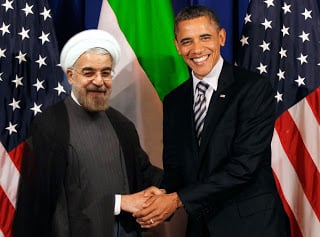“Obama’s Approach to Iran Would Have Been Different Had the Ayatollahs Been Anti-Black Racists Rather than Anti-Semites”
 Former Israeli Ambassador to the U.S. Michael Oren continued his criticism of the Obama administration Friday and speculated that President Barack Obama’s outreach to the Muslim world may have been motivated by his childhood trauma of being abandoned by his Muslim father and step-father.
Former Israeli Ambassador to the U.S. Michael Oren continued his criticism of the Obama administration Friday and speculated that President Barack Obama’s outreach to the Muslim world may have been motivated by his childhood trauma of being abandoned by his Muslim father and step-father.
He also opined that the president would not likely have trusted Iran’s leaders with the ability to one day achieve nuclear weapons had they been anti-black racists, as opposed to anti-Semites bent on destroying Israel.
In an op-ed in Foreign Policy magazine, Oren explained how when he was first appointed ambassador he spent months “studying the new president, poring over his speeches, interviews, press releases, and memoirs, and meeting with many of his friends and supporters,” an endeavor he nicknamed “Obama 101.”
Offering his analysis on one of the possible motivations behind Obama’s new approach to the Muslim world “based on mutual interest and mutual respect” declared early in his presidency, Oren wrote:
In addition to its academic and international affairs origins, Obama’s attitudes toward Islam clearly stem from his personal interactions with Muslims. These were described in depth in his candid memoir, Dreams from My Father, published 13 years before his election as president. Obama wrote passionately of the Kenyan villages where, after many years of dislocation, he felt most at home and of his childhood experiences in Indonesia. I could imagine how a child raised by a Christian mother might see himself as a natural bridge between her two Muslim husbands. I could also speculate how that child’s abandonment by those men could lead him, many years later, to seek acceptance by their co-religionists.
Yet, tragically perhaps, Obama — and his outreach to the Muslim world — would not be accepted.
In an op-ed in the Los Angeles Times – also published Friday — the former ambassador suggested that Obama’s approach to Iran’s leaders might have been different had they been anti-black racists rather than anti-Semites.
Oren first described the difference between the U.S. administration’s view of Iran as a rational player as opposed to Israel which sees the Iranian leadership more as “religious fanatics who deny the Holocaust, blame all evil on the Jews and pledge to annihilate the 6 million of them in Israel.”
Oren wrote:
The Americans tended to see Iranian leaders as logical actors who understood that the world would never allow them to attain nuclear weapons and would penalize them mercilessly — even militarily — for any attempt to try.
By contrast, most Israelis viewed the ayatollahs as radical jihadists who claimed they took instructions from the Shiite “Hidden Imam,” tortured homosexuals and executed women accused of adultery, and strove to commit genocide against Jews. Israelis could not rule out the possibility that the Iranians would be willing to sacrifice half of their people as martyrs in a war intended to “wipe Israel off the map.”
Oren cited an interview Obama gave the Atlantic’s Jeffrey Goldberg last month in which he said, “The fact that you are anti-Semitic, or racist, doesn’t preclude you from being interested in survival.” The former ambassador suggested Obama’s approach might have been different had the adversary been anti-black racists:
Obama’s argument not only fails logic’s test but also history’s. Anti-Semitism, the president further explained to Goldberg in May, “doesn’t preclude you from being rational about the need to keep your economy afloat [or] being strategic about how you stay in power.” Except, in one infamous example, it did. The Nazis pursued insane ends. Even during the last days of World War II, as the Allied armies liberated Europe, they diverted precious military resources to massacring Jews.
Obama would never say that anti-black racists are rational. And he would certainly not trust them with the means — however monitored — to reach their racist goals. That was the message Israeli officials and I conveyed in our discreet talks with the administration. The response was not, to our mind, reasonable.
Israeli Member of Knesset Yair Lapid Sunday called Oren’s analysis of Obama’s Muslim-influenced childhood “utter nonsense” and criticized Oren for his public censure of the U.S. president.
“It’s not expected of diplomats to already write books one day after they finish their job. It harms Israel-U.S. relations at a time that they are already damaged,” Lapid told Israel’s Army Radio.
According to reported excerpts from his book, Ally: My Journey Across the American-Israeli Divide, which is set to be released on June 23, Oren described how he initially got the cold-shoulder from then-Secretary of State Hillary Clinton after asking to meet her; how State Department staffers secretly listened in on a meeting in which he was upbraided by a top official – then cheered; and how he heard Obama once suggest to Israeli Prime Minister Netanyahu that the pro-Hamas Islamist Turkish leader Recep Tayyip Erdogan wasn’t so bad.
State Department spokesman John Kirby last week accused Oren, who is a historian recently elected to Knesset, of being “a politician who’s promoting a book.”
“It’s the secretary’s view that his account, particularly the account of President Obama’s leadership in the U.S.-Israeli relationship, is absolutely inaccurate and false, and doesn’t reflect what actually happened in the past,” Kirby said, describing Secretary of State John Kerry’s view on some of Oren’s charges.
Kirby said that Oren had “limited visibility into many of the private discussions and deliberations that he describes.”
